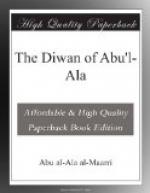The words of Abu’l-Ala concerning day and night (quatrain 2) may be compared with what he says elsewhere:
These two, young for ever,
Speed into the West—
Our life in their clutches—
And give us no rest.
“Generation goeth and generation cometh,” says Ecclesiastes, “while for ever the earth abideth. The sun riseth also and the sun goeth down and cometh panting back to his place where he riseth.” . . . The early dawn, the time of scarlet eyes, was also when the caravan would be attacked. However, to this day the rising sun is worshipped by the Bedawi, despite the prohibition of Mahomet and despite the Moslem dictum that the sun rises between the devil’s horns. Now the divinity of the stars (quatrain 4) had been affirmed by Plato and Aristotle; it was said that in the heavenly bodies dwelt a ruling intelligence superior to man’s, and more lasting.[2] And in Islam, whose holy house, the Kaaba, had traditionally been a temple of Saturn, we notice that the rationalists invariably connect their faith with the worship of Venus and other heavenly bodies. We are told by ash-Shahrastani, in his Book of Religious and Philosophical Sects, that the Indians hold Saturn for the greatest luck, on account of his height and the size of his body. But such was not Abu’l-Ala’s opinion. “As numb as Saturn,” he writes in one of his letters,[3] “and as dumb as a crab has every one been struck by you.” Elsewhere he says in verse:
If dark the night, old Saturn is a flash
Of eyes which threaten from a face of
ash.




